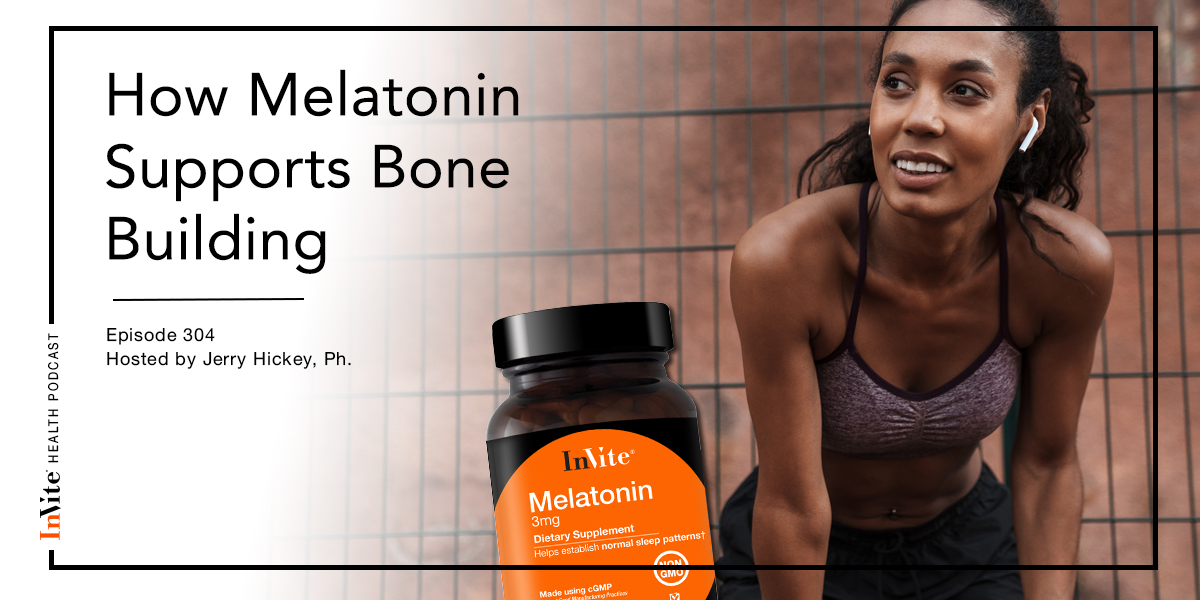How Melatonin Supports Bone Building – InVite Health Podcast, Episode 304

melatonin
Invite Health Podcast, Episode hosted by Jerry Hickey. Ph
Subscribe Today!
NASA and other space agencies are looking into nutrients and plant ingredients to protect astronauts in future flights. That’s becoming increasingly important because flights are becoming longer and therefore more dangerous. For instance, from what I’ve read, a round-trip flight for astronauts to Mars should take about three years. That means there is no ozone layer, so these future martians are going to be exposed to a lot of different types of radiation that are going to be a little toxic for them. This can damage their immune system. Plus, there’s no gravity. What happens when you don’t have gravity? You’re not pushing against anything, so you lose muscle and bone.†
Researchers are looking at different things for space flights, especially these long-haul flights, that can help support the health of these astronauts. They’re looking at algae, nucleotides and resveratrol for their benefits for the immune system and muscles. They’re also looking at melatonin for bone.†
Reduce Your Risk Of Hip Fractures & Support Bone Health – InVite Health Podcast, Episode 295. Listen Now >>
Learn more about the basics of bones by tuning into the full podcast episode.
Research on melatonin for bones
Here’s some research along that line from the Journal of Pineal Research, which focuses on the pineal gland, a part of the body that is involved with sleep and your body’s internal rhythm. That’s a lot more important than you’d ever expect. Getting disengaged from your body clock, which we call your circadian rhythm, leads to many bad things. It’s connected to heart disease, diabetes, a whole bunch of cancers, poor immune system function and a lack of bone building. This internal clock is really important and one of the things that controls this clock is melatonin. You start to release melatonin from the pineal gland when it’s starting to get dark and that sets you up for sleep. It also sets you up for bone building, controlling your blood pressure and controlling pain in the daytime. It does a lot of things.†
This particular study, called “Melatonin is a potential treatment for the prevention of bone loss during space flight,” was done by researchers in Japan. It was done by about 30 different academic research institutions throughout Japan. They look at multiple different reasons why astronauts can lose bone. One thing they said was that a lack of gravity stimulates osteoclasts. An osteoclast is a cell that breaks down bone. Melatonin stimulates the inhibition of osteoclasts, but at the same time, it promotes osteoblasts, which are cells that rebuild bone.†
Here’s another study from the Journal of Pineal Research, called “Melatonin: another avenue for treating bone loss and osteoporosis.” It’s from researchers throughout China and they said that age-related loss of bone is related to a drop in melatonin release. They said age-related reductions in melatonin are considered to be critical factors in bone loss and osteoporosis with aging.†
Why Strontium Is An Important Mineral For Bone Health – InVite Health Podcast, Episode 257. Listen Now >>
The truth of the matter is that they find that one way they know if a woman is going to lose bone is by checking the urine. Why would they check the urine? They’re looking for two things. They’re looking to see if collagen is breaking down because 36% of your bone is collagen. If they find breakdown products of collagen in the urine, that indicates that you’re starting to lose bone. The other thing they look at is breakdown products of melatonin. After you use melatonin, it’s converted into other things and that should be in the urine. If they see a lack of melatonin in the urine, they have to be concerned about future bone loss.†
Listen to the full podcast episode for more research showing the importance of melatonin for bone building.
Thank you for tuning in to the Invite Health Podcast. You can find all of our episodes for free wherever you listen to podcasts or by visiting www.invitehealth.com/podcast. Make sure you subscribe and leave us a review! Follow us on Facebook, Twitter and Instagram at Invite Health today. We’ll see you next time on another episode of the Invite Health Podcast.


